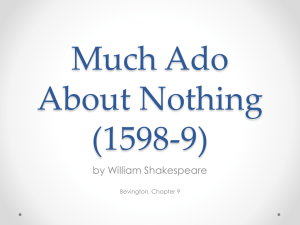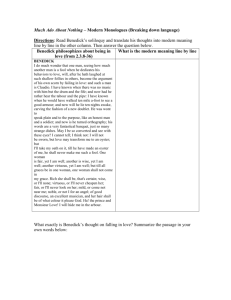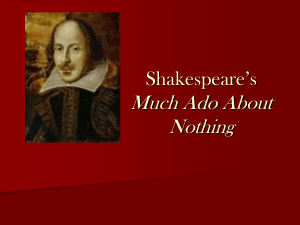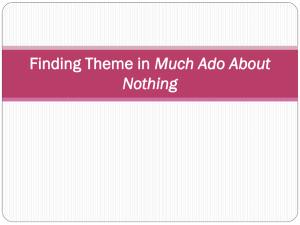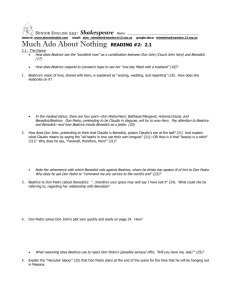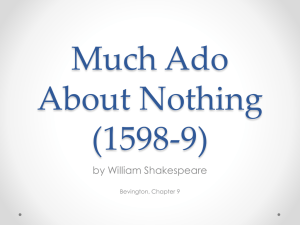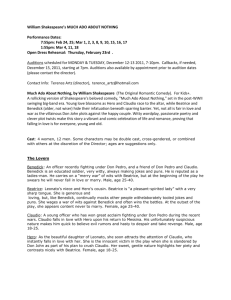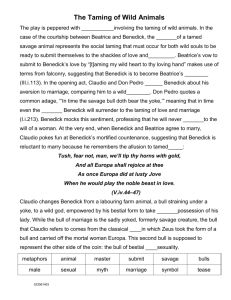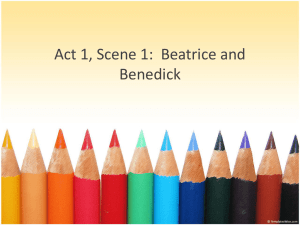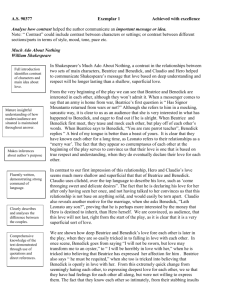Much Ado About Nothing Questions Act I, scene 1 How might the
advertisement
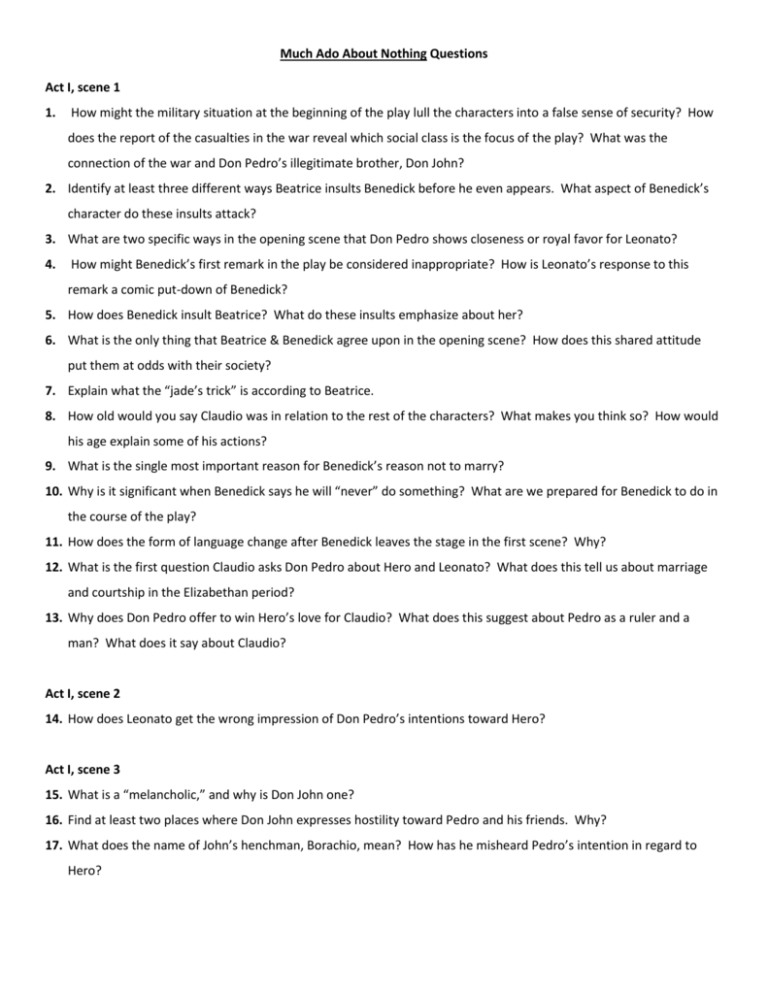
Much Ado About Nothing Questions Act I, scene 1 1. How might the military situation at the beginning of the play lull the characters into a false sense of security? How does the report of the casualties in the war reveal which social class is the focus of the play? What was the connection of the war and Don Pedro’s illegitimate brother, Don John? 2. Identify at least three different ways Beatrice insults Benedick before he even appears. What aspect of Benedick’s character do these insults attack? 3. What are two specific ways in the opening scene that Don Pedro shows closeness or royal favor for Leonato? 4. How might Benedick’s first remark in the play be considered inappropriate? How is Leonato’s response to this remark a comic put-down of Benedick? 5. How does Benedick insult Beatrice? What do these insults emphasize about her? 6. What is the only thing that Beatrice & Benedick agree upon in the opening scene? How does this shared attitude put them at odds with their society? 7. Explain what the “jade’s trick” is according to Beatrice. 8. How old would you say Claudio was in relation to the rest of the characters? What makes you think so? How would his age explain some of his actions? 9. What is the single most important reason for Benedick’s reason not to marry? 10. Why is it significant when Benedick says he will “never” do something? What are we prepared for Benedick to do in the course of the play? 11. How does the form of language change after Benedick leaves the stage in the first scene? Why? 12. What is the first question Claudio asks Don Pedro about Hero and Leonato? What does this tell us about marriage and courtship in the Elizabethan period? 13. Why does Don Pedro offer to win Hero’s love for Claudio? What does this suggest about Pedro as a ruler and a man? What does it say about Claudio? Act I, scene 2 14. How does Leonato get the wrong impression of Don Pedro’s intentions toward Hero? Act I, scene 3 15. What is a “melancholic,” and why is Don John one? 16. Find at least two places where Don John expresses hostility toward Pedro and his friends. Why? 17. What does the name of John’s henchman, Borachio, mean? How has he misheard Pedro’s intention in regard to Hero? Act II, scene 1 1. According to the lecture, why is Beatrice probably living with her uncle? How does her situation in the household make her attitude toward love and marriage more unusual? How does she “prove” that she will never love a man? What seems to be Beatrice’s reason for opposing marriage? How does it differ from Benedick’s? 2. What is a “conceit” in Shakespeare’s works, and which one does Beatrice use to describe the process of wooing, wedding, and repenting? 3. What do Leonato and Antonio want Hero to do if the Prince proposes? What does Beatrice advise her to do? 4. Why did gentlemen wear masks at the dance? 5. How does Pedro try to impress Hero when they dance? How does she respond? 6. How does Ursula first recognize her partner is Antonio? How does she try to make him feel better? 7. How does the interchange between Benedick and Beatrice when they dance differ from that of the other couples? How does he insult her in two ways? How does she insult him? Which of her insults seems to hurt him the most? Why? 8. At the party, why does Claudio pretend to be Benedick when approached by Don John? What does Claudio believe has happened with Pedro and Hero? What does Benedick think has happened? What’s the significance of the willow? 9. How does Benedick use hyperbole? Identify two of his best examples. 10. Explain Benedick’s reference to Hercules having to “turn spit” and chop up his club. 11. Why does Don Pedro appear to propose marriage to Beatrice? Why might he be serious? Why might it be in jest? How does she treat the proposal? What connection might there be between this proposal and Pedro’s planned deception of Beatrice and Benedick? Act II, scene 2 12. How do we know that Don John and Borachio are aware of the possible consequences of their planned deception? Act II, scene 3 13. What are three ways Benedick believes love has changed Claudio’s behavior? 14. What are eight “graces” which Benedick believes a hypothetical woman must have before he would consider marrying her? What one quality is he flexible upon? 15. Why does Benedick hide when Claudio, Pedro, and Leonato come in to talk? 16. What one element of the “gulling scene” seems to convince Benedick that it is no trick? What effect does the news of Beatrice’s possible suicide have on Benedick? 17. What are three different ways that Benedick’s friends question his personal character? 18. What is Beatrice’s meaning in the message she delivers to Benedick? What does he think she means? Act III, scene 1 1. How does the form of the language in this gulling scene differ from that used in the scene with Benedick? Why the difference? 2. What are three elements found in common in the gulling of both Benedick and Beatrice? 3. What is unusual about the form of the language of the last 10 lines in this scene? Why does Shakespeare have Beatrice speak like this? Act III, scene 2 4. According to Claudio and Pedro, how has Benedick changed since we last saw him? How does Benedick explain the change in his behavior? 5. Explain the reference to extracting a tooth- “You must hang it first and draw it after.” 6. How does Don John’s choice of language make the impact of his revelation about Hero all the more devastating to Claudio? 7. Why does Claudio immediately announce he will shame Hero in the church at the wedding? Act III, scene 3 8. What is the serious social problem underlying the satire on Dogberry and the all-volunteer watch? 9. Why does Dogberry utter so many malapropisms? Identify three such misuses of words. 10. What seems to be Dogberry’s primary concern in his instructions to the volunteer watchmen? 11. How are the watchmen able to discover what Borachio has done? How much do they understand of what they have found? 12. From what we learn from Borachio’s account of the deception, how was he able to fool the Prince and Claudio? Act III, scene 4 13. Which character provides most of the comic banter in this scene? 14. How has Beatrice changed in this scene from her previous behavior? Act III, scene 5 15. What does Dogberry want above all to communicate to Leonato in this scene? Why? How does this impede the discovery of the crime against Hero? 16. What is the great honor which Leonato bestows upon Dogberry and Verges? Act IV, scene 1 1. Why do Claudio and Don Pedro decide upon public humiliation of Hero at the wedding? 2. How does Leonato react to Claudio’s accusation at the wedding? Why? 3. How has Benedick’s allegiance shifted in this scene from what it had been before? Why? 4. How does Leonato interpret Hero’s facial expression? How does Friar Francis? 5. Who is the first to name Don John as the villain behind the plot? 6. What is the purpose of Friar Francis’ deception about Hero’s supposed death? 7. What is the backup plan if Hero’s reputation cannot be salvaged? 8. How does the language change once Beatrice and Benedick are alone? Why? 9. Who declares love first for the other, Benedick or Beatrice? Why? What is the complicating factor in the romantic climax between Beatrice and Benedick? 10. How does Benedick’s decision to challenge Claudio represent a major change for his character? Act IV, scene 2 11. What is the basis of Dogberry’s understanding of the syntax of the English sentence? 12. How does Dogberry confuse various criminal charges? 13. What event, reported here for the first time, tends to confirm the charges against the villains? 14. What is the worst crime, according to Dogberry, that the villains are guilty of? Why is it so important to Dogberry that the evidence of this crime be written down? How does Dogberry defend himself against this criminal slander? Act V, scene 1 1. How do the dynamics between Leonato and Antonio change in the course of this scene? 2. Do Claudio and Don Pedro display any remorse for the death of Hero in the beginning of this scene? 3. When Benedick challenges Claudio, what is Claudio’s reaction? Act V, scene 2 4. Why has Benedick had trouble writing a love poem for Beatrice? 5. How romantic is the exchange between Beatrice and Benedick in this scene? Act V, scene 3 6. Why does Leonato insist that Claudio perform this ritual of public mourning for Hero? Act V, scene 4 7. Given all that has happened to her, why would Hero go ahead and marry Claudio? 8. What reasons do Beatrice and Benedick give in the end for marrying each other?
